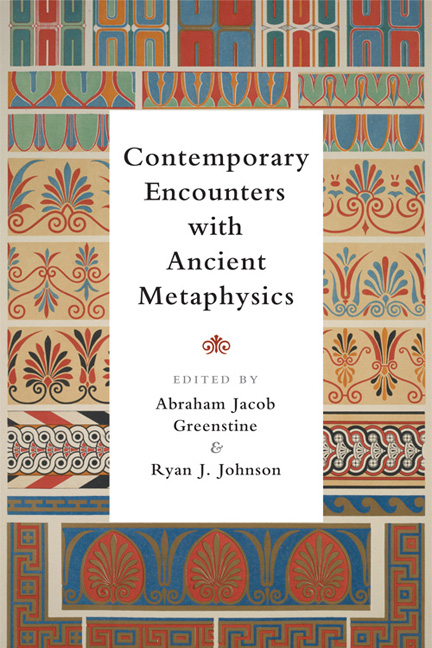Book contents
- Frontmatter
- Contents
- Acknowledgements
- Note on the Text
- Notes on Contributors
- 1 A Thousand Antiquities
- Part I Plato
- 2 The Muses and Philosophy: Elements for a History of the Pseudos [1991]
- 3 Odysseus’ Changed Soul: A Contemporary Reading of the Myth of Er
- 4 Plato's Protagoras: The Authority of Beginning an Education
- 5 Univocity, Duality, and Ideal Genesis: Deleuze and Plato
- 6 “Adjust Your Dread”: Badiou's Metaphysical Disposition
- Part II Aristotle
- Part III Epicureans, Stoics, Skeptics, and Neo-Platonists
- Part IV Postscript
- Index
6 - “Adjust Your Dread”: Badiou's Metaphysical Disposition
from Part I - Plato
- Frontmatter
- Contents
- Acknowledgements
- Note on the Text
- Notes on Contributors
- 1 A Thousand Antiquities
- Part I Plato
- 2 The Muses and Philosophy: Elements for a History of the Pseudos [1991]
- 3 Odysseus’ Changed Soul: A Contemporary Reading of the Myth of Er
- 4 Plato's Protagoras: The Authority of Beginning an Education
- 5 Univocity, Duality, and Ideal Genesis: Deleuze and Plato
- 6 “Adjust Your Dread”: Badiou's Metaphysical Disposition
- Part II Aristotle
- Part III Epicureans, Stoics, Skeptics, and Neo-Platonists
- Part IV Postscript
- Index
Summary
WHAT IS THE FORM OF THE DISCOURSE?
What is the problem of which metaphysics is the inquiry? Passing by Heidegger's imagistic allusions to soil, extrapolated from Descartes's letter to Picot outlining the arborescence of philosophy (a metaphor Deleuze turned on its side), perhaps it was the great rival to Heraclitus, Parmenides, who, eschewing organic metaphor altogether, truly expressed it best: the same is to think as to be. The gap, indistinction, or indiscernibility between “thought” or thinking and “what is,” by no means necessarily a “separation” to be resolved, is what metaphysics names, and it goes without saying that working out the places and operations implies and entails a lot of toing and froing, of back and forth, of fortlda.
Parmenides’ injunction, or perhaps declaration – it is important to remark the type of his utterance – is then in no way an answer, definitive, or even propositional, for nothing is to be tested or verified as such. Rather it is the task for philosophy to take up, the consequences philosophy draws each and every time it exists. Every time it is made, this declaration marks the recommencement of philosophy, and it provokes, every time, the question: “What is the form of the discourse by which being lets itself be said?” The answer, evident in the developed orientations to it – analytical, phenomenological, existential, formal, etc. – in turn positions being and thought with regard to each other. It decides: what of being can be thought, and thus what (is) not. In other words, it establishes being for thought – whether as potential, limit, chaos, imaginary, whole, indeterminate, inconsistency, and so on. Immediately, we can see that Parmenides’ declaration – maybe even a declaration of war or πόƛεμος contra Heraclitus, the type of declaration the latter would have to respect – separates the thought of being from the imperative of nature, insofar as insisting on the indifference of being and thought is to unify them only in terms of the void – the nothing that is. What makes them indifferent cannot be something or other, some third thing relative to them. There is literally nothing to tell them apart.
- Type
- Chapter
- Information
- Contemporary Encounters with Ancient Metaphysics , pp. 86 - 116Publisher: Edinburgh University PressPrint publication year: 2017



